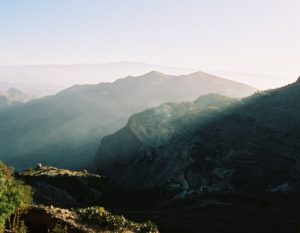While there is no singular view among the Arabs about their ancestors and their place of origin, the following is a view many would adopt. The excerpt below is from my unpublished novel Kuwaiti Seeker in the words of its protagonist, Yacoub. You will note that Yacoub combines ideas from both the Quran and the Old Testament.
“This is how our people came to be. Those who long preceded us came from our own place, where we now reside [the Arabian peninsula]. Our ancestors proceeded north and settled the fertile land between the two great rivers, dispossessing those less able than ourselves, for we are by nature invaders and not defenders. Through our own driven efforts of generation, we spawned the Jews.
“Our great father and prophet, Noah, told the people ‘Ask forgiveness from your Lord; for He is oft-forgiving (The Meaning of the Holy Qur’an, Abdullah Yusef Ali, 71.10).’ For Noah knew their misdeeds. And ‘What is the matter with you, that ye place not your hope for kindness and long-suffering in Allah (71.13)?’ And more, Noah said, ‘O my Lord! They have disobeyed me, but they follow (men) whose wealth and children give them no increase but only loss. (71.21).’ Our father Noah warned the people but they did not look to Allah. ‘Because of their sins they were drowned (in the flood), and were made to enter the Fire (of Punishment): and they found – in lieu of Allah – none to help them. (71.25).’
“The book of the Jews and Christians tells us Noah’s son, Shem, came next. We are all sons of Shem [hence, both Arabs and Jews are Semites]. Shem was righteous and covered his father’s nakedness preserving the honor of our tribe. His descendant Eber gave life to Peleg and Joktan. Eber means ‘divide’, and in the time of Eber the peoples of the earth were divided by language. But through Eber the thread of language that binds us to the other sons of Shem was preserved.
“Peleg and Joktan wandered (know now that we come by this trait rightly). From Pelelg came Abraham who lived first in the hilly desert not more than a day’s drive north of our diwaniya [discussion group characteristic of Kuwait] tonight. His ziggurat of Ur is still seen in the wind-blown desert. Abraham preached the worship of Allah to his father, Azar, who did not believe the truth. So Abraham left him. He proved his faith when he agreed to sacrifice Ishmael [Christians say Issac], who was saved only through the will of Allah. Ishmael’s mother Hagar took him away from the spiteful Sarah and into the waterless desert. Once again Allah preserved them when the spring of Zamzam came out of the ground. It was there that Abraham and Ishmael built our holy house, and Allah sanctified the Kaaba. And it is there we return for our pilgrimage.
“Out of the tent of Abraham and Ishmael came our progenitor Adnan and out of his tent, Mohammed. And the northern desert of our great peninsula yielded to them. We still picture Adnan as he has become in our memories: long-faced, unperturbed, difficult but strong and brave, the long curved nose marking his demeanor, such that he came to resemble the Hurr falcon which he used to hunt the houbara bustard.
“Out of Eber, also, had come Joktan. The people of Joktan traveled south around the great desert, along the western coast of the Red Sea. Like their father Yoktan, they were fleshy, round-faced and full of sloth. They settled in the Hadramawt, which is the place of death.”

